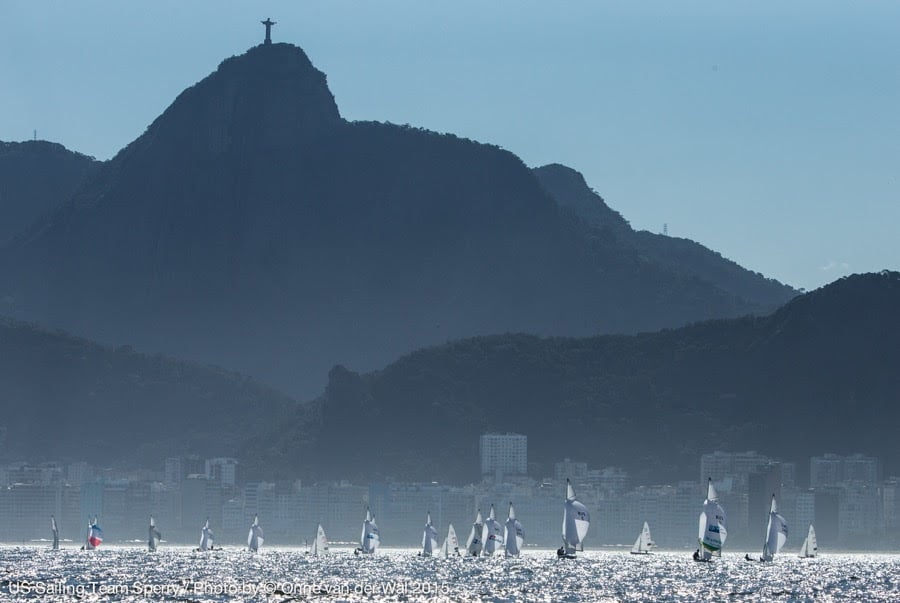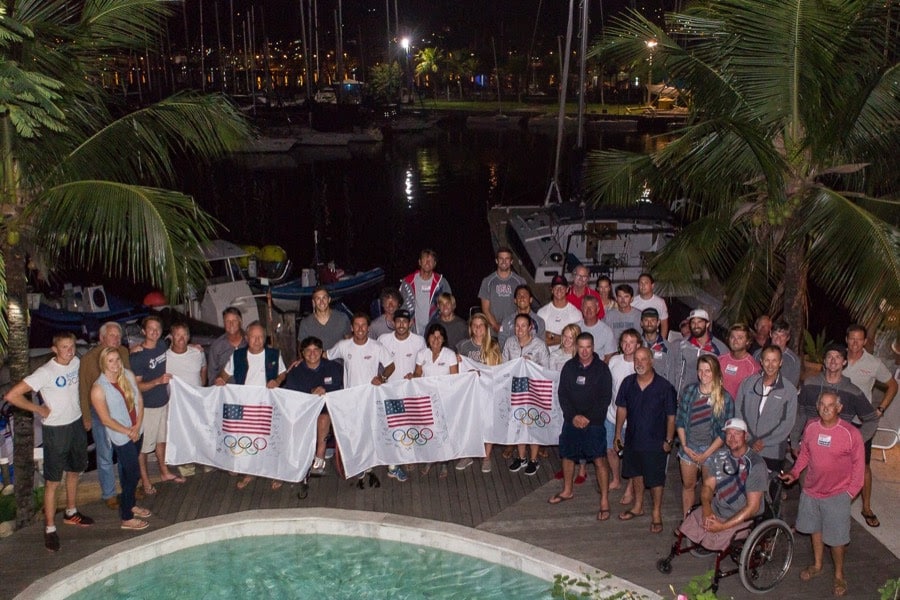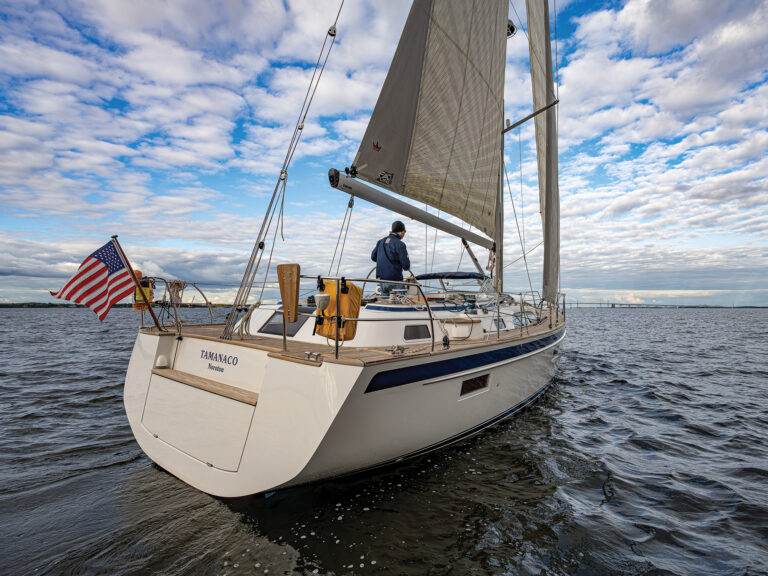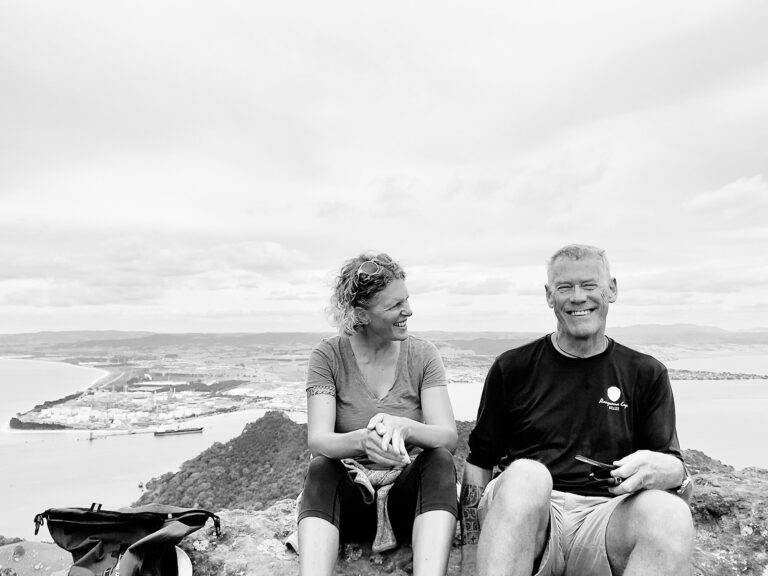
On August 5, when the U.S. Olympic Sailing Team lines up to march as part of Team USA in the Rio 2016 Opening Ceremony, the athletes will be confident in the knowledge that they have completed extensive preparations to compete in Rio. The US Sailing Team Sperry committed early in the 2016 Olympic quadrennium to “embrace Rio” and acclimatize to the Games environment. We have worked for several years to learn and experience the Rio 2016 competition venue, and everything that Rio delivers with its challenging racing conditions, spirited culture and concerns about health and safety. With the spotlight about to shine bright on the Olympic Games, I’d like to take the opportunity to share some of the details of USA’s preparations with you.
The team has followed a high-performance plan that features comprehensive research of Rio’s sailing conditions while maximizing the athletes’ training time on the Olympic racecourses. Over the years the US Sailing Team Sperry has built and managed a large-scale operation in Rio, which resulted in an unmatched training infrastructure for American sailors. The athletes have sailed extensively on the seven Rio racecourses, in the best equipment, while surrounded by a team of coaches and experts dedicated to supporting them. We have assembled a world-class coaching staff for Rio 2016, drawn from the ranks of proven performers on the biggest stages in the sport. To prepare for such a wide range of conditions across the Rio courses—four courses inside Guanabara Bay and three ocean courses outside the bay—we’ve studied the winds and currents with a combination of technology, expert analysis, athlete & coach input and the time investment required to gain experience. USA sailors have done the work to prepare for Rio racing and feel comfortable in Rio’s challenging Games setting. It’s a place where we enjoy sailing and living, and though comfort doesn’t win sailboat races it certainly helps the athletes form a winning mindset.

A major part of our national team’s preparation for the Rio 2016 Olympic Games continues to involve measures to prepare athletes for potential issues surrounding health and safety. Long before media headlines appeared about the challenges Rio presents as host of the Olympic and Paralympic Games, we had concerns about the health and safety of US Sailing Team athletes. We set out to prepare them for the experience, and have closely monitored the situation over the past three years. US Sailing started taking actions in 2013 with measures that seek to control what we can control and give our team confidence about the concrete steps taken to keep them healthy, safe and ready to race.
Our strategy from the beginning, and one shared by many top teams, was to maximize our training days on the Games racecourse. To efficiently and safely accomplish this, we needed a home base in Rio that offered access to all the Rio 2016 racecourses and security for personnel and equipment. This brought us to Niteroi, a suburb across the bay five miles to the east of the city. The US Sailing Team training base in Niteroi has met our team’s needs since on-site training began in 2013 and introduced us to incredibly welcoming, generous and talented locals we now consider to be part of our team. It’s one of the only venues in the area that can fit our team’s large footprint—Olympic and Paralympic race boats, coach boats, and enough spare gear to fill an entire 40-foot container. A big reason we landed in Niteroi was to establish a base of operations that would provide a safe and convenient environment to train. Although Niteroi is not immune from security risks, it has served us well through the training periods, during which U.S. athletes, coaches and support staff have followed a tried-and-tested team safety protocol.
From a strategic point of view, we viewed data acquisition and analysis as critical to success. Because Rio has never been a regular stop on the Olympic sailing circuit, there isn’t an existing body of experience to draw from. It takes years to learn the nuances of Guanabara Bay’s flat-water and current-driven courses as well as the open-water ocean courses outside the bay. The athletes have timed their training with the tide cycle matching the Games tide and learned to prepare for what will likely be compact racing days—sailing from 1300-1730 on a typical day—due to a late-filling sea breeze and early winter sunset. Many US Sailing Team athletes have personally logged more than 125 days in Rio in preparation for the Games, experience that has been informed by the team’s medical protocol.

After completing our own water testing in 2014 in collaboration with the U.S. Olympic Committee, our team’s medical advisors from the University of Miami formed a set of recommendations that serve as the basis of a protocol designed to protect athletes and coaches. Preparations include vaccinations, best practices to mitigate risks on and off the water, and treatment guidelines in the event someone falls ill. The protocol has incorporated athlete and coach feedback and gets updated continuously. We have gained valuable experience in Rio, while following the expert medical advice of team doctors, and feel there are concrete steps that can be taken to keep our athletes and coaches healthy.
Recent refinements to the team’s medical protocol deal primarily with the Zika virus. The team has approached Zika the same as water pollution—gather information, inform the athletes, mitigate risks and be prepared to treat. Zika remains a developing international medical concern, and we feel confident in the work the USOC Sports Medicine team is doing to advise our team. It helps that the Olympic and Paralympic Games occur during winter, with cooler temperatures and fewer mosquitos. Regardless of the time of year, we follow guidelines for prevention of mosquito bites and work closely with the USOC medical team on a plan for rapid testing and treatment of symptoms.
When the team lands in Rio next week for the Games period, we will activate our city operations plan, with most athletes and several coaches living in the Olympic Village. Several factors led to our decision to stay here, including security, nutrition control and its motivational Olympic atmosphere. The majority of the team’s staff will stay at a dedicated US Sailing Team headquarters compound near the Marina da Gloria sailing venue. The same staff that has supported the athletes throughout their training periods in Niteroi— coaches, a sports psychologist, physiotherapists, a tactical advisor and local professional chefs—will be based at this facility. We are working in partnership with the USOC on team security and medical coverage during the Games period, with plans that cover the sailing team between the Village, Gloria team headquarters and sailing venue.
With these preparations in place, the athletes are in position to focus on what they’ve spent their careers training for—racing at the Olympic Games. Team USA will be in Rio for the express purpose of performing, and we’ll sail with the confidence that comes from being acclimated to an environment. We’re excited about the racing, and with a few weeks to go our whole team, from the athletes to the staff supporting them, is feeling “Rio ready.” As sailors who have benefitted from a positive experience while training these past few years in Rio, we hope the world will enjoy watching our sport on display against the beautiful backdrop of Rio de Janeiro. Go USA!
Sincerely,
Josh Adams Managing Director of US Olympic Sailing Team USA Team Leader (Sailing)








